|
|
|
Sort Order |
|
|
|
Items / Page
|
|
|
|
|
|
|
| Srl | Item |
| 1 |
ID:
141722
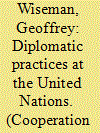

|
|
|
|
|
| Summary/Abstract |
This article considers the importance of informal, practice-based change as opposed to formal change at the UN. I first evaluate UN reform, showing that diplomacy and institutional change within the UN system are better understood as having evolved less from major, formal reform of the UN Charter (‘the Charter’) than from minor changes in routine practices. I then examine what practice theory and diplomatic studies can learn from each other in terms of how each views the role of leading individuals, illustrating specific practice-based change in relation to the Secretary-General’s role. Next, I show how the appointment process for a new Secretary-General has evolved through informal practice, after which I advance an argument that UN diplomatic practices should be considered not only within the narrow context of a formal diplomatic corps of member state diplomats but also as part of an informal, wider diplomatic community of diplomats and non-state actors. Practice theory helps students of diplomacy think more abstractly and systematically about mundane diplomatic practices. Students of diplomacy can help guide practice theory toward empirical diplomatic activities that are often internalized and taken for granted. I conclude that a dialog between the two fields will promote a better understanding of diplomacy as undervalued practices.
|
|
|
|
|
|
|
|
|
|
|
|
|
|
|
|
| 2 |
ID:
141724
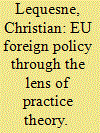

|
|
|
|
|
| Summary/Abstract |
There is a proliferation of works on the new European External Action Service (EEAS). Most of these approach the EEAS through a rationalist framework, assessing how a new institution can solve long-term questions of EU foreign policy-making to ensure consistency and coherence while reducing transaction costs between actors (both supranational and national) in a multilevel governance structure. This paper takes a different direction. Using 30 interviews with officials from the EEAS, the European Commission, and national ministries of foreign affairs, conducted between 2010 and 2013, it shows how the study of practice aids understanding of the nature of the EEAS. As a new institution, the EEAS lends itself particularly well to practice-based study because new institutions must develop new practices.
The first section of the article defines the notion of practice and shows the importance of historicizing the struggles around practices in understanding the creation of the EEAS. The second section demonstrates how agents’ practices shape professional cultures within the EEAS. The third section highlights the relationship between practices and rule-making. Going over the EEAS as a case study, the conclusion focuses on the importance of analysing actors’ practices for understanding the current evolution of diplomacy and international relations in general.
|
|
|
|
|
|
|
|
|
|
|
|
|
|
|
|
| 3 |
ID:
141723
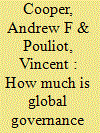

|
|
|
|
|
| Summary/Abstract |
Is the G20 transforming global governance, or does it reinforce the status quo? In this article we argue that as innovative as some diplomatic practices of the G20 may be, we should not overstate their potential impact. More specifically, we show that G20 diplomacy often reproduces many oligarchic tendencies in global governance, while also relaxing club dynamics in some ways. On the one hand, the G20 has more inductees who operate along new rules of the game and under a new multilateral ethos of difference. But, on the other hand, the G20 still comprises self-appointed rulers, with arbitrary rules of membership and many processes of cooption and discipline. In overall terms, approaching G20 diplomacy from a practice perspective not only provides us with the necessary analytical granularity to tell the old from the new, it also sheds different light on the dialectics of stability and change on the world stage. Practices are processes and as such they are always subject to evolutionary change. However, because of their structuring effects, diplomatic practices also tend to inhibit global transformation and reproduce the existing order.
|
|
|
|
|
|
|
|
|
|
|
|
|
|
|
|
| 4 |
ID:
141721
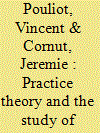

|
|
|
|
|
| Summary/Abstract |
This introductory article explores the multiple synergies between international practice theory and diplomatic studies. The timing for this cross-fertilizing exchange could not be better, as the study of diplomacy enters a phase of theorization while practice scholars look to confront the approach to new empirical and analytical challenges. The article first defines diplomacy as a historically and culturally contingent bundle of practices that are analytically alike in their claim to represent a given polity to the outside world. Then the key analytical wagers that practice theory makes are introduced, and debates currently raging in the discipline are briefly reviewed. Next, it is suggested what a practice theory of diplomacy may look like, discussing a variety of existing works through their common objective to explain the constitution of world politics in and through practice. Finally, a few research avenues to foster the dialogue between diplomatic studies and practice theory are outlined, centered on the nexuses of transformation and reproduction, rationality and know-how, and the technical vs. social dimensions of practices –diplomatic or otherwise.
|
|
|
|
|
|
|
|
|
|
|
|
|
|
|
|
| 5 |
ID:
141727


|
|
|
|
|
| Summary/Abstract |
Innovative mechanisms of global governance are increasingly common, yet they defy easy categorization. The Alliance of Civilizations, a UN initiative that seeks to promote intercultural dialogue, is one such example. It is a hybrid entity that exhibits elements of networks, international organizations, and public–private partnerships, among other things. Only when we shift our gaze to its patterned activities do we discover that it might best be understood as a community of practice specializing in global-level public diplomacy. Practice-based analysis, therefore, allows a deeper understanding of the Alliance and, in turn, prompts a fresh consideration of an increasingly important form of diplomacy. I argue, in particular, that public diplomacy is not solely a national-level, state-oriented activity. In turn, this inquiry invites practice theorists to reflect on the degree of fit required to associate a unique social form with an identifiable set of patterned activities.
|
|
|
|
|
|
|
|
|
|
|
|
|
|
|
|
| 6 |
ID:
141725
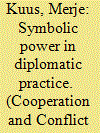

|
|
|
|
|
| Summary/Abstract |
This paper investigates the workings of symbolic power in diplomatic practice. At the level of empirical observation, it focuses on the intangible and incalculable ‘feel for the game’ that distinguishes a well-informed and relaxed insider from an ill-informed and ill-at-ease outsider in European Union (EU) diplomatic circles in Brussels. By highlighting the play of social resources, such as reputation, presence, poise, and composure in these circles, I examine EU diplomacy from an angle – symbolic power – that is often overlooked in the existing work on that field. Conceptually, the analysis focuses on the role of informal social resources rather than formal institutional structures in diplomatic practice. It also outlines the potential synergies between the study of diplomacy in international relations (IR) on the one hand and geography, anthropology, and sociology on the other. The paper thereby advances the analytical toolbox of diplomatic studies and practice theory. Such conceptual sharpening is needed, especially now that diplomacy is becoming more transnational and less linked to the foreign ministries of states.
|
|
|
|
|
|
|
|
|
|
|
|
|
|
|
|
| 7 |
ID:
141726


|
|
|
|
|
| Summary/Abstract |
This article shows that the simultaneous management of three different social roles – knowledge producer, representative of a government, and bureaucrat – defines the everyday work and practice of contemporary diplomats posted at embassies. This argument rests on an analysis of information gathering in Western embassies before, during and after the eighteen days of the revolt that ousted Egyptian President Hosni Mubarak in 2011. I first identify various practices influencing diplomatic knowledge and prompting the production of particular interpretations of the revolt in Egypt. I then analyze how actors manage multiple positions and dispositions within overlapping social fields. This point illustrates what practice theorists mean when they assert that agents are always speaking from a position. Overall, the article unravels what being a diplomat posted abroad actually consists of in practice, complementing existing studies on the diplomatic mode of knowledge production. I provide insights on the interactions between diplomats and non-state actors and show that diplomats’ social skills and analytic competence constantly require and support each other.
|
|
|
|
|
|
|
|
|
|
|
|
|
|
|
|
|
|
|
|
|